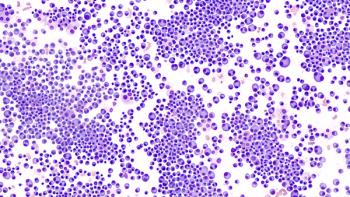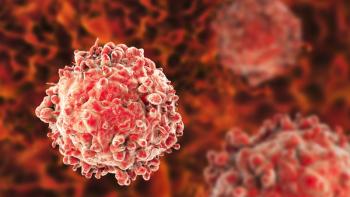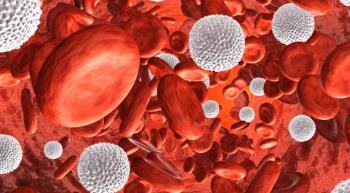
COVID-19 Vaccine May Not Be Effective in Patients With Multiple Myeloma
Patients with multiple myeloma are potentially at greater risk of developing severe COVID-19 after the SARS-COv-2 vaccination induced suboptimal antibody response.
Recent data indicated that nearly a fifth of patients with multiple myeloma who received 2 doses of the SARS-CoV-2 vaccinations did not develop SARS-Cov-2 spike-binding IgG antibodies. Researchers worry that this population is potentially at a greater risk for developing severe COVID-19, according to study published in Cancer Cell. 1
Lead study author Oliver Van Oekelen, MD, and colleagues evaluated SARS-CoV-2 spike-binding immunoglobulin G (IgG) antibody levels in 320 patients with multiple myeloma who received COVID-19 vaccinations in early 2021. Most patients (69.1%) received the BNT162b2 vaccine by Pfizer, 27.2% received Moderna’s mRNA-1273 vaccine, and 3.8% received an unknown mRNA vaccine.
Of these patients, 260 (81.3%) had SARS-CoV-2 spike-binding IgG antibody levels measured at least 10 days after receiving the second vaccine dose (range, 11-118). Of the fully vaccinated patients, 84.2% (219/260) developed measurable SARS-CoV-2 spike-binding IgG antibody levels.
“What was more important, and in a way, a little bit more worrying to us, was that more than 15% of the patients had no detectable IgG after receiving 2 [doses of the] vaccine at least 10 days prior,” Van Oekelen said. Forty-one (15.8%) patients did not develop any SARS-CoV-2 spike-binding IgG antibodies.
“That was somewhat surprising, although it has been confirmed in other cancer types, especially in different blood cancer types, by other groups.”
Additionally, 24 (58.5%) of the nonresponders were receiving CD38-directed therapy at the time of vaccination, 13 (31.7%) were receiving BCMA-directed bispecific antibody therapy, and 4 (9.8%) had received BCMA-directed CAR-T therapy more than 3 months prior.
“We also saw, at least at [the time of the analysis], that at least 10 patients after partial [n = 7] or complete vaccination [n = 3], developed COVID-19, and a handful of these patients were hospitalized. Some of these patients went to the intensive care unit, suggesting that patients that don’t have any IgG antibodies might be at risk for contracting the virus.”
In an interview with OncLive®, Van Oekelen, a PhD candidate and graduate assistant in the Graduate School of Biomedical Sciences at Mount Sinai, discussed the results and implications of the study, as well as plans for further research.
OncLive®: Why was it important to study SARS-CoV-2 spike antibody responses to the COVID-19 vaccine in patients with multiple myeloma?
Van Oekelen: Patients with multiple myeloma are immunocompromised, either because of the disease itself, whichcauses a dysfunction of the immune system, or the treatments that they’re receiving. Very often patients are getting multiple lines of chemotherapy or immunotherapy, and we know that these drugs have an effect on the immune system. At the same time, we have studies now showing excellent efficacy for all the vaccines that are available in the United States. We wanted to see whether that efficacy translated to our patients as well, because we were worried that perhaps they might not have as good of an immune response to the vaccine.
What methods were used to evaluate patients’ immune responses to the vaccine?
We collected blood and saliva in several patients with myeloma who enrolled on our trial at multiple time points. We collected [the specimens] before vaccination, and then at some prespecified time points after, and it’s still going on as we’re trying to measure the longitudinal response as well. We combined that data with retrospective analysis from patients who were seen in our clinic at Mount Sinai, and those time points were not prespecified, but just measurements that were taken by clinicians at their discretion. That allowed us to get a comprehensive picture in about 300 patients to see whether they mount antibodies to the mRNA vaccines.
What did the findings show? Did anything come as a surprise to you?
Patients with myeloma had significantly lower levels of IgG to the SARS-CoV-2 protein after vaccination [compared with healthy individuals], which was not that surprising. In general, for other diseases, or for other vaccinations, we don’t tend to measure these IgG levels. We do it now because [COVID-19 is] a new disease, and we want to understand it better. But as I said earlier, [low levels of IgG] can be because of the immunosuppressive effect of drugs or the disease itself.
We also had patients who had COVID-19. One question we had when we saw that 15% of the patients mounted no antibodies or no IgG at all was: Who are those patients? What is their profile? When we looked at which patients were unable to develop antibodies, we saw it was mostly patients that were on a CD38-directed monoclonal antibody and patients that were receiving BCMA-directed treatments. Both drugs are known to affect B cells, so that was not that unexpected, but it’s [an] important [finding], especially as CD38-directed treatment is being used extensively in myeloma at this point and the BCMA-directed treatments are growing rapidly. We’re [now] trying to figure out exactly how to explain the fact that these drugs were most associated with not developing antibodies.
The second question was: Does it matter? Does it matter that patients have no antibodies? [We learned that] that clearly matters.
Could the lack of antibodies indicate a delayed response to the vaccine that may become more apparent with a booster shot?
We have data now that, in some patients, extends up to 100 days after vaccination. Just by waiting, there is very little chance that patients who do not have detectable antibodies will get them over time. The important question is: What should we do about it? How should we approach these patients? There have been some data in transplant patients who are also immunosuppressed because of the drugs they receive against rejection, that giving a third shot at 3 or 6 months, or perhaps giving a different vaccine after getting 2 shots, helps some patients to achieve serial positivity or develop antibodies. It’s really a question of whether this could be translated to patients with cancer. We are looking into options to study this. Some of the companies are exploring booster shots as well. It will be important, especially in high-risk patients such as patients with cancer to see whether that can help some patients mount antibodies and be protected.
Even though the study was done in patients with multiple myeloma, could the findings be extrapolated to patients with solid tumors and other immunocompromised individuals?
Multiple myeloma is a disease of the plasma cells, which are the cells that are producing antibodies in normal circumstances, and so, in a way, it is not surprising to see that they have trouble making antibodies because they receive treatments that suppress [malignant] plasma cells and healthy plasma cells to some extent. We have seen similar results come out, sometimes in smaller cohorts or in more heterogeneous cohorts, where a significant proportion of patients failed to develop antibodies. It’s not always 15%; in some diseases, it’s probably a little bit more, and in others, it might be a little bit less. It’s important to identify these people to give them the proper counseling. That’s the most important approach that we take at Mount Sinai. We try to measure these antibodies at least once in patients after vaccination so that we can give them appropriate counsel. We owe it to our patients. Many of those patients have been taking a lot of precautionary measures, more so than many healthy people. We owe it to them to give them good counsel and good advice and tell them whether they should be careful going forward as the country is opening.
What does that counseling typically consist of?
The counsel that we give to our patients is to be cognizant of the fact that they don’t have any antibodies in their blood. We must explain that, and it’s some somewhat of a difficult talk because we must explain things we don’t [understand] as well. We realize that our immune system is much more than just IgG antibodies. We have set up extra assays with the samples that we have to study cellular immunity and T-cell immunity more specifically and to look at the immune system more comprehensively and innate immunity to really understand whether these patients are protected. With the information that we have now, we tell them to be careful. A lot of patients come to us now asking: Can we travel? Can we see family? If we don’t see any antibodies [in their blood], we will tell them that it’s probably best to be more careful and to perhaps maintain wearing a mask or be careful with gathering in large groups and realize that that they might not have the same protection as a healthy person after 2 shots of an mRNA vaccine.
What are the next steps that you plan on taking regarding this research?
Going forward, we’re not only studying or thinking about booster shots. Another approach that could be feasible is using prophylactic antibodies, and that could be IVIG [intravenous immunoglobulin], which we use regularly in patients with myeloma with a high risk for infection. Because the IVIG is often collected from healthy people, as there is a lot of serial prevalence in the society, the IVIG, at this point contains COVID-19 antibodies as well. That might help patients, especially high-risk patients and patients as they are going to specific treatments for myeloma.
An alternative strategy would be to use the monoclonal antibodies that have been approved or have been used against COVID-19 infections. It’s important that we do this rigorously, and that we study it in an appropriate cohort and see whether they protect our patients.
Reference
Van Oekelen O, Gleason CR, Agte S, et al. Highly variable SARS-CoV-2 spike antibody responses to two doses of COVID-19 RNA vaccination in patients with multiple myeloma. Cancer Cell. 2021;S1535-6108(21)00336-6. doi:10.1016/j.ccell.2021.06.014
This artricle was originally published on OncLive as
Newsletter
Knowledge is power. Don’t miss the most recent breakthroughs in cancer care.































































































